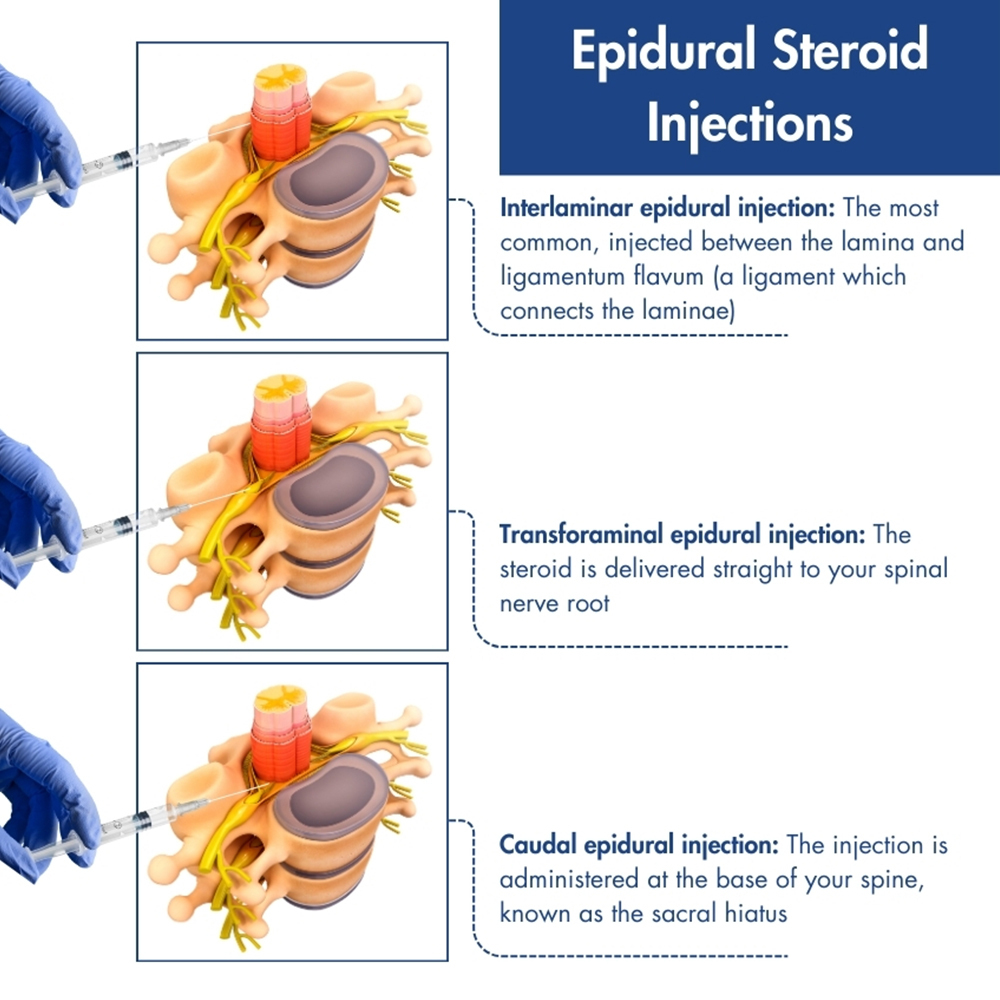We’re pleased to announce that Pain Physicians of Wisconsin is now Pro Spine Pain.
We’re pleased to announce that Pain Physicians of Wisconsin is now Pro Spine Pain.
 Epidural steroid injections are a medical procedure that helps alleviate lower back pain and a range of other spinal conditions. It involves the administration of a corticosteroid medication combined with a local anesthetic, into the epidural area of your spinal canal. This area holds a lot of fat that protects your spinal cord and nerves from surrounding damage.
Epidural steroid injections are a medical procedure that helps alleviate lower back pain and a range of other spinal conditions. It involves the administration of a corticosteroid medication combined with a local anesthetic, into the epidural area of your spinal canal. This area holds a lot of fat that protects your spinal cord and nerves from surrounding damage.
Once administered, your spinal nerves start to numb, and pain signals traveling to your brain are blocked. Within 10-20 minutes the corticosteroid starts to take effect and Inflammation around your spine is significantly reduced, along with pain.
An epidural shot is often used to help manage conditions such as herniated discs, spinal stenosis, sciatica, and other conditions that cause spinal nerve compression. These injections can last from a few weeks up to one year. However, the duration of pain relief they provide may differ between you and the next patient.
To know if an epidural injection is best for you, visit one of our specialists for a consultation. With decades of clinical experience and board certifications in pain management and anesthesiology, they will connect you to the most transformative and long-lasting treatment for your spine.
There are several types of epidural steroid injections. Your location of pain, condition, and preference from your physician will decide the type of epidural injection you have.
The main types are:
If you feel sharp, intense pain in your arms, legs, ribs, or lower back, then an epidural shot may provide you with instant relief.
You may also be eligible if you have any of the following conditions:
If you have any of these conditions or sharp pain that’s impacting the quality of your life, book an appointment with us at Pro Spine & Pain. You’ll be met by a talented team of board-licensed doctors and advanced practice providers at our state-of-the-art clinics in Wisconsin.
With their knowledge, skillset, extensive surgeries performed, and a patient-centric approach, they’ll accurately diagnose you, administer an epidural injection, or connect you to the right spinal treatment.
At Pro Spine & Pain, our pain management doctors and anesthesiologists comply with the highest clinical standards. Before the procedure, they’ll diligently conduct a consultation addressing your concerns, medical history, and symptoms. If you have an allergy to contrast dye or medical conditions like diabetes, you must inform them.
To ensure the accuracy and effectiveness of the injection, they’ll use advanced diagnostic imaging, such as moving an X-ray along to provide images of your spine in real time during the procedure.
Then they will:
This is an outpatient procedure that usually takes 10-20 minutes. After administration, you may be kept for a short period of time for observation, and then you’ll be allowed to return home. The following day, you can resume normal activities and work. Most of the time, the steroid takes effect from 1-3 days; however, sometimes, it can take up to a week.
If you don’t experience pain relief, it may be a sign you need a further injection. It could also likely signify that the pain is coming from a place other than your spinal nerves.
An epidural steroid injection generally causes no problems.
If you do have side effects, they may include:
More serious complications (rare) are:
At Pro Spine & Pain we frequently administer this minor injection to many patients, across all of our five clinics. Dr. Stauss, Dr. Aasen, Dr. Tsoulfas, and Dr. Reyes have performed thousands of these injections and have had very few complications. After receiving an epidural injection, you’re likely to diminish your pain and reclaim your quality of life back in a few days.
Epidural shots can last around a few weeks to an entire year. During this time, you’ll find your pain significantly reduced. Sometimes, you may experience shorter pain relief or none; if this happens, your pain might be from an underlying condition.
Due to the administration of local anesthesia and a steroid, you may experience heavy sensations and numbness afterward. Within 30 minutes, you should be able to walk; however, you should be careful and follow the instructions of your physician.
Epidural injections can help treat acute and chronic spinal conditions associated with low back pain. This treatment is an effective short-term and long-term solution for many spinal conditions. To know if you need an injection, book a consultation with us.

Thomas Stauss, MD, completed both his undergraduate and medical studies at the esteemed University of Wisconsin in Madison. Dr. Stauss values having access to a wide array of cutting-edge treatment options, ensuring effective relief for his patients' discomfort and a significant enhancement in their quality of life. More specifically, he specializes in utilizing implanted devices to manage chronic pain. Dr. Stauss’s primary objective is to uphold the dignity of each patient while delivering ethical and professional services.
More about Dr. Stauss